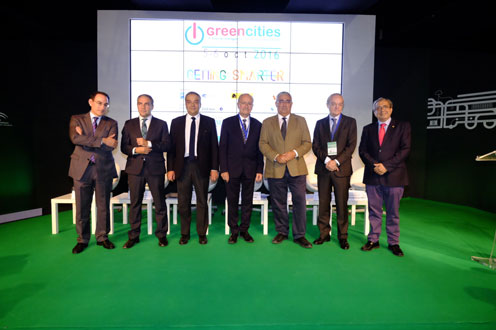5 and 6 October in Malaga
National Smart Cities Plan of Spanish Ministry of Industry, Energy and Tourism highlighted at Greencities Forum in Malaga
News - 2016.10.5
Through the State Secretariat for Telecommunications and the Information Society [Spanish acronym: SETSI], the Spanish Ministry of Industry, Energy and Tourism showcased the Spanish smart cities model to people from all over the world.
The State Secretary for Telecommunications, Victor Calvo-Sotelo; the Mayor of Malaga, Francisco de la Torre; the Councillor for Economic Affairs and Knowledge of the Regional Government of Andalusia, Antonio Ramírez de Arellano; and the Chairman of AMETIC, Jose Manuel de la Riva, officially opened the 7th Greencities Forum alongside other officials.
In his speech, Víctor Calvo-Sotelo said this is a great opportunity for Spain to showcase the Spanish smart cities model to people from all over the world and to also learn from overseas experiences in order to continue improving in this area. "The National Smart Cities Plan approved in 2015 enshrines our commitment to this industrial sector and its development in Spain. The plan is producing results and enabling our country to position itself as a clear benchmark at a global level. Suffice it to say that the recent annual report by the Broadband Commission for Sustainable Development of the ITU and UNESCO highlights and devotes ample content to the launch of this plan in our country".
Subsequently, the Mayor of Malaga, Francisco de la Torre, stressed that the efforts made by SETSI have enabled Greencities 2016 to become a launch platform for the regulatory work undertaken by said secretariat - together with AENOR - to draw up a clear and rigorous roadmap for all those cities and municipalities that have decided to take up this challenge. "The celebration of Greencities is fully in line with the city's strategy (channelled through the Malaga, City of Knowledge initiative), which has positioned this provincial capital as the area of greatest excellence in Europe in this field, where innovative actions have led to a considerable improvement in city management and lowered public service costs. The most recent milestone in this regard was the Civitas City of the Year award, the highest distinction in terms of urban mobility presented by the European Union".
National Smart Cities Plan Spanish model
Smart cities represent great business potential. According to analyses and reports published, the potential worldwide market to 2020 could be worth up to 1.5 trillion dollars. The size of this market is growing at a pace of over 20% year-on-year.
The National Smart Cities Plan officially defines the Government of Spain's commitment to this field as an opportunity to foster the development of an international technology industry on the one hand and as a way to improve the public services offered to citizens on the other.
The plan fundamentally consists of three lines of action:
- Standardisation, in pursuit of re-use and interoperability
- Promotion of industry, with a significant focus on subsidies from SETSI through Red.es: Announcement of City Funding I (15 million euros) in June 2014; Announcement of City Funding II (63 million euros) in August 2015; and Announcement of Island Funding I (30 million euros) in August 2015
- Governance of the plan via the Smart Cities Advisory Council
AENOR Technical Committee on Standardisation 178 "Smart Cities". The importance of standards
A major focus has been placed on the Spanish standardisation system for smart cities at this Greencities Forum. Enrique Martínez, SETSI representative, spoke about coordination between authorities, cities and the industry as key to creating a sustainable model. Furthermore, Tania Marcos, AENOR Standardisation Director and Government Representative at the World Smart Cities Forum, explained the Spanish standardisation system. Over the course of the next two days, numerous panels on vertical agreements regarding regulatory content will be held.
State Secretary Víctor Calvo-Sotelo also attended an assembly of the AENOR Technical Committee on Standardisation 178 this morning, which relocated its plenary session to the Greencities Fair in Malaga. The Spanish smart cities standardisation system and its governance is channelled through the TCS 178 on smart cities (chaired by SETSI), at which 700 experts from all the stakeholders involved work on drawing up technical standards that will foster the roll-out of smart cities in Spain. The first 20 standards have already been published.
At the assembly, an agreement was reached to submit two new standards to a public consultation process: the accessibility standards project and the street lighting standards project.





